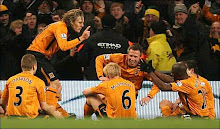
Brian Horton's connections with Manchester City ceased long ago, but that is unlikely to stop him wanting more than anyone to put them to the sword this weekend.
Horton got fearful criticism for being the 'unshowbiz' appointment to the Manchester City manager's job under Peter Swales following Peter Reid's dismissal. As names and on-pitch achievements in the newfangled Premier League became more worthwhile, stupidly, than coaching qualifications or managerial experience, Horton never properly was allowed to settle at Maine Road.
During his tenure, the Swales Out campaign took a vice-like grip and the chairman with hair resembling a generous application of shoe-polish was forced out. Francis Lee, playing hero of the club in its 60s and 70s heyday, came in, spending his bog paper proceeds on a boardroom coup. And, immediately, everybody in the media assumed that Horton's days would be numbered.
This is something which has rankled with Horton ever since. He has managed numerous clubs in his 24 year association with the game since his first appointment (at Boothferry Park, of course) but this seemingly counted for nothing. He didn't play for England, won nothing with his club - hell, he even began as a non-league player. All this was apparently more significant than a wealth of experience with Hull City and Oxford United, from which his promotion tally was better than his relegation tally - put simply, he got promoted with the Tigers in his first season and very nearly made it two in a row the season after. Relegations? With either club? None.
Lee himself had no reason other than stamping his own mark on the club to dismiss Horton, given that the team were playing admirable football and making use of Horton's longtime love for wingplay. Peter Beagrie and Nicky Summerbee were giving full backs hell and Niall Quinn and Paul Walsh, later Uwe Rosler, were happily getting on the end of their wares. Despite proactive, entrancing football though, the media weren't happy that Horton was not Lee's appointment.
Horton did eventually go, of course, in unlucky circumstances. Lee appointed his old England mucker Alan Ball, a World Cup winner and one of the great English players of his or any generation, and - well, a Manchester City fan could remind us of the disaster that became. To this day, some clubs don't learn that an awe-inspiring, bemedalled playing career doesn't mean management will suit. Bobby Charlton was a poor manager. Bobby Moore was catastrophic. Bryan Robson benefitted from his playing career entirely when acquiring work, given that far better managers with 90 fewer England caps and four fewer FA Cup winners medals were available and rejected for the jobs he got. Ball, a qualified success elsewhere, profited from Lee's personal friendship with him but his club were relegated.
Horton developed a mistrust for the media for some time afterwards, and it was clear that the iciness he sometimes portrayed during subsequent spells at Huddersfield, Brighton & Hove Albion and Port Vale was a lingering symptom of the faithless treatment he received from Lee's pals in the press. This is a man who, while at Macclesfield Town, completed 1,000 matches in charge of football teams - a stat only a handful of gaffers, with Ferguson and Clough among them, had already achieved.
Manchester City was the pinnacle in terms of size and status of Horton's managerial career. Horton has it on his CV - a Premier League manager with an authentic English giant. However, ask him where he achieved most in his non-playing career and it would come as no surprise if he still opted for Hull City - from 1984 to 1988, and again from 2007 onwards. And if a team he now helps shape and encourage beats the team he left due to little more than pettiness and politics, that achievement will have gone just a little further.



.jpg)






